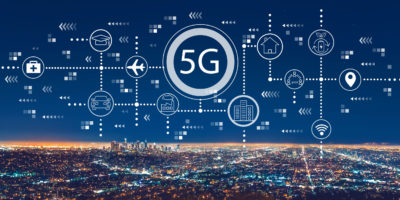UPDATE The Department of Defense, on behalf of itself and several other federal agencies, is preparing to challenge the FCC’s approval of Ligado’s 5G network plans. During a hearing before the Senate Armed Services Committee that went into the evening Wednesday, Pentagon officials said Ligado’s mobile network would interfere with GPS signals that are critical to its operations.
Committee Chairman James Inhofe (R-OK) criticized the FCC for approving the plan. “This is a complex issue, but it ultimately boils down to risk. And I do not think it is a good idea to place at risk the GPS signals that enable our national and economic security for the benefit of one company and its investors,” he said.
“This will certainly affect our war fighters,” and more than the military, he added, noting the plan to build a mobile network on L-band would disrupt GPS used by farmers, truckers and banks, which rely on GPS for transaction timing. “Economic security is national security,” Inhofe said. Continue Reading
Michael Griffin, DoD’s Under Secretary of Defense for Research and Engineering, said: “Every time you use an ATM you’re using the GPS timing signal to conduct an encrypted transaction. Credit card swiping machines are dependent upon GPS,” totaling in an industry worth over $100 billion. “That’s what’s at risk!” he emphasized.
Ranking Member Jack Reed of Rhode Island said Ligado, the former Lightsquared, came out of bankruptcy and re-submitted its plan in 2016. The company changed its proposal from a satellite-based mobile network to a “new ground tower system,” he said. “No consensus was reached before the license was granted” by the FCC, Reed said.
General John Raymond is Chief of Space Operations for the U.S. Space Force and Commander of U.S. Space Command. He said GPS was first used by the military to navigate in the desert at night in Operation Desert Storm. Today, DoD operates 31,000 satellites using GPS. The signals coming down to earth from satellites travel 12,000 miles, he said. “For receivers to pick up these faint signals, they have to operate in a noise pristine environment,” he said, comparing that to the quiet car on a train.
“Ground emitters will interrupt the GPS signal. The 23 MHz buffer zone will not mitigate all the interference. It’s about half of the buffer zone we have today,” Raymond testified. GPS, “is integrated into our weapons systems. GPS allows us to shoot and move along every step of the kill chain,” he explained. Raymond also noted GPS is critical to homeland defense as well as military and commercial space launches.
Proponents of Ligado’s plan, including the majority at the FCC, praise the sharing of L-band for future wireless use. DoD Chief Information Officer Dana Deasy said, “We fully support America’s leadership in 5G. Ligado is not offering a 5G solution,” he said, noting Ligado would only comprise about three percent of future 5G uses. He called the repurposed Ligado license, “a classic case of bait and switch.”
DoD studies showed Ligado’s system would cause interference on L-band, he said, noting the FCC made its decision using studies paid for by Ligado, that said there could be interference.
The FCC included interference mitigation steps in its Order, but the military officials said it leaves it up to them to tell the agency there’s interference, which would be impractical for the millions of its devices that use GPS. Admiral Thad Allen, USCG (Ret.) spoke as a private citizen. He gave an example, saying: “Wishful thinking will not repeal the law of physics. If you lose the GPS signal, [in some cases] you can reboot and plant” crops, using a GPS-guided tractor. “But it’s different if you’re piloting a firefighting helicopter.”
The DoD is conducting experiments to study how commercial entities and the military could share L-band.
Neither representatives from Ligado nor the FCC were asked to testify. Inhofe said he wanted to focus on national security issues. In a letter to the committee regarding the hearing, Ligado wrote: “In recognition of the importance of GPS and the concerns of the DoD, the FCC established a comprehensive coordination regime that requires Ligado to provide six-months advance notice before deploying; to have a 24/7 monitoring capability, a hotline, a stop buzzer or kill switch; to work directly with any federal agency with concerns about the potential for interference; and to repair or replace at Ligado’s cost any government device shown to be susceptible to harmful interference.”
The Commission has consistently said it was guided by science and acted appropriately on the issue when it voted last month.
Senate Commerce Committee Chair Roger Wicker (R-MS), was at Wednesday’s hearing. He’s thinking about holding a hearing as well. Wicker’s committee has jurisdiction over the FCC. It’s unclear at this point whether lawmakers would draft legislation to change the outcome.
In the meantime, the DoD is asking the National Telecommunications and Information Administration to formally request the FCC to reverse its decision on behalf of itself and eight other federal agencies, including the Department of Homeland Security. The Administration has until May 29 to do so.
By Leslie Stimson, Inside Towers Washington Bureau Chief





Reader Interactions